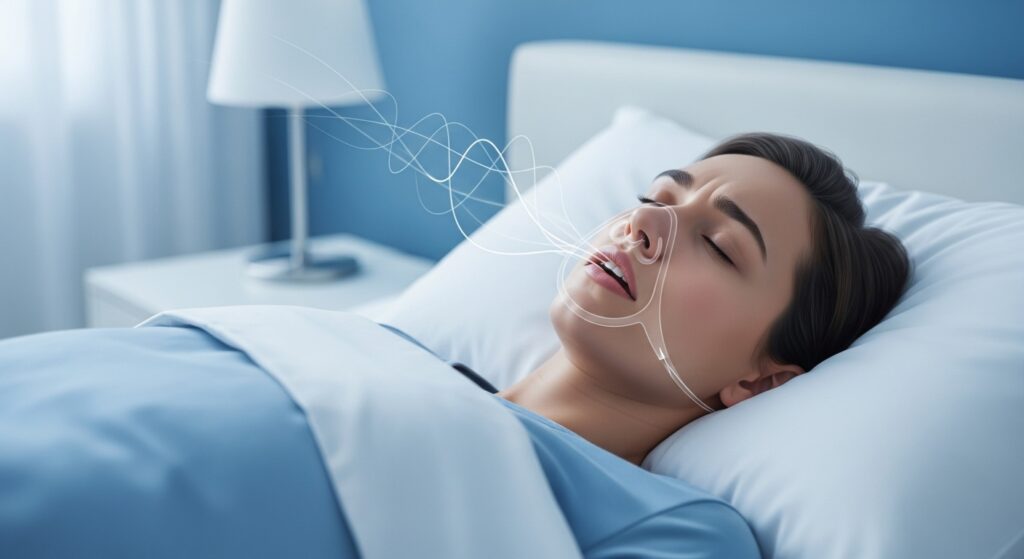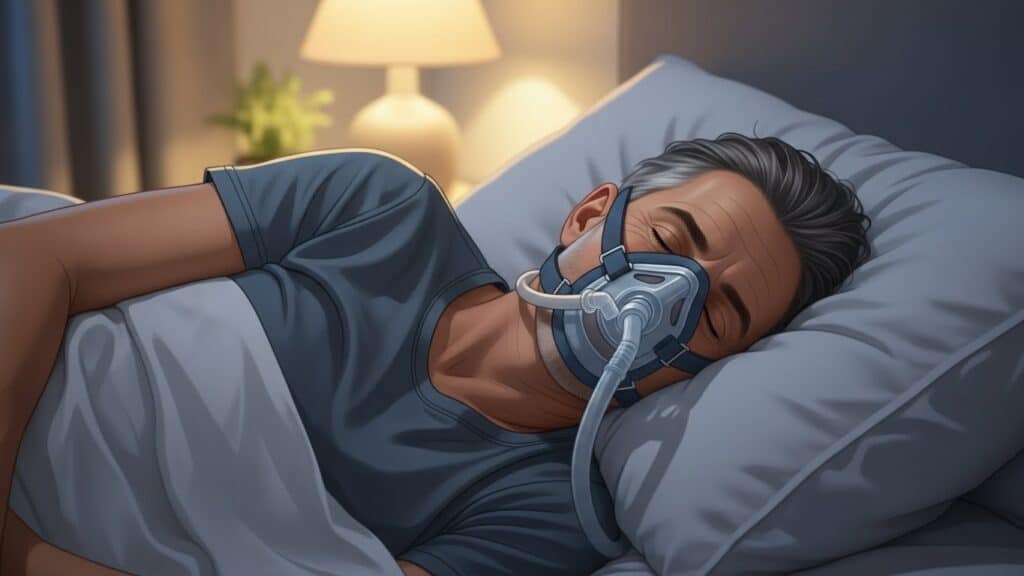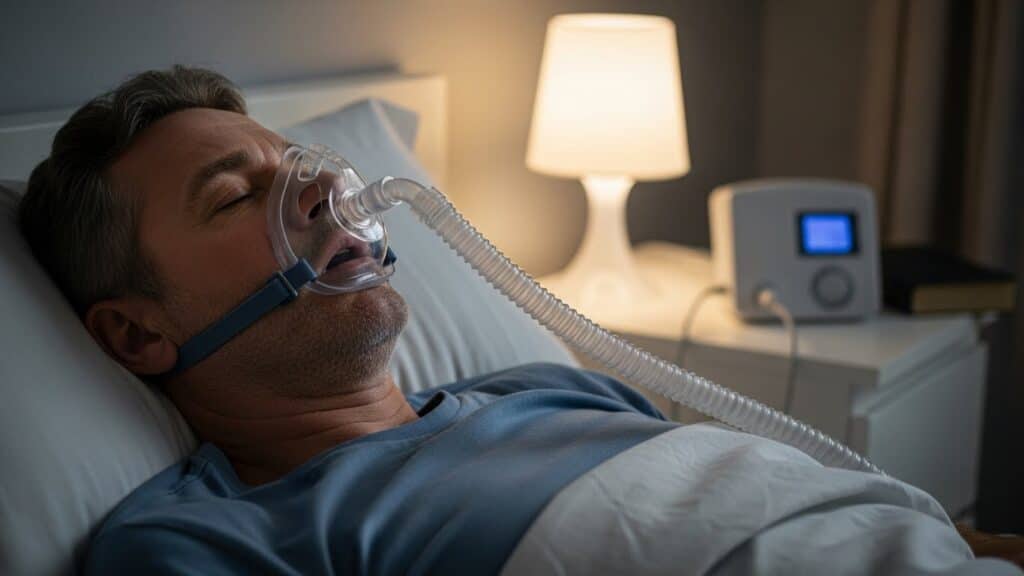Have you ever woken up in the middle of the night gasping for air or feeling like your throat was closing? That scary moment can leave your heart racing and your body confused. It might even make you afraid to fall back asleep. Many people don’t realize this could be a sign of sleep choking syndrome, a condition linked to sleep apnea that causes short pauses in breathing during the night.
Around 80% of sleep apnea cases go undiagnosed—so millions live with its dangers without even knowing. Your body needs steady breathing to rest and repair itself. When something blocks your airway, it can interrupt that process, leaving you tired, irritable, or even anxious the next day.
But once you understand what’s happening and learn the warning signs, you can take steps to fix it and sleep peacefully again.
Let’s jump in by looking at what happens inside your body when you stop breathing while you sleep.
What Happens When You Stop Breathing in Your Sleep
When you sleep, your muscles relax—including those in your throat. For some people, the soft tissues in the back of the throat can fall inward and block the flow of air. This is what happens during breathing stop during sleep episodes.
Your brain quickly senses the lack of oxygen and wakes you up just enough to reopen your airway. You might make a choking sound, snort, or gasp for air. Often, you don’t remember it the next morning, but it can happen many times a night.
Over time, these small interruptions can lead to big problems:
- Poor rest: Your brain never reaches deep, refreshing sleep.
- Fatigue: You may feel sleepy or foggy during the day.
- Heart strain: Frequent oxygen drops make your heart work harder.
- Mood changes: You may feel more irritable or have anxiety while sleeping.
Some people also experience dry mouth at night because they breathe through their mouth to try to get more air. Others develop supine apnea, which happens mostly when sleeping on their back.
If this sounds familiar, it’s important to talk to a sleep specialist. They can test your breathing during sleep and find out how severe the problem is. Knowing what’s going on is the first step toward better rest and better health.
Why It’s Easy to Miss the Warning Signs
Sleep apnea can be tricky. You might think you’re sleeping through the night, but your body knows otherwise. Because the episodes happen while you’re asleep, you often don’t notice them. That’s why many people go years without realizing they have a serious issue.
Here’s why it can go unnoticed:
- Silent awakenings: You may wake up for just a few seconds, not long enough to remember.
- Blaming tiredness on stress: People often think daytime fatigue comes from work or poor habits.
- Sleeping alone: Without someone to notice choking or gasping, it’s harder to spot.
- Gradual changes: You may slowly get used to feeling tired and forget what good sleep feels like.
You might also notice some small clues: waking with a sore throat, headaches, or dry mouth at night. You could feel groggy even after eight hours in bed. These are signs your sleep is being interrupted, even if you don’t realize it.
Many people don’t seek help until the problem becomes severe—when they fall asleep during the day or start having health issues like high blood pressure. But it doesn’t have to get that far. Pay attention to how you feel in the morning and how alert you are during the day. If you snore loudly or wake up choking, it’s time to take action.
A simple sleep study can show how often your breathing pauses and how your oxygen levels change. A sleep specialist can then suggest the right treatment, such as a CPAP machine or changing your sleep position.
Catching these signs early can make all the difference. It means safer nights, clearer mornings, and energy that lasts all day.
When Snoring Becomes a Serious Problem
Snoring might seem harmless—or even funny sometimes—but it can also be a major clue that something’s wrong. Regular, loud snoring can point to airway blockage and sleep choking syndrome.
Not every snore is a red flag. Many people snore lightly when they have allergies or a cold. The problem starts when snoring happens almost every night or comes with other symptoms.
Here’s when to pay attention:
- You wake up gasping, coughing, or choking.
- Someone tells you that you stop breathing in your sleep.
- You feel sleepy or have trouble focusing during the day.
- You wake up with a headache or dry mouth at night.
People with supine apnea often snore more loudly when lying on their back, as gravity pulls the tongue and soft tissues toward the throat. Sleeping on your side may help, but it won’t always solve the problem completely.
Loud snoring can also affect the people around you. Partners often notice it first and may even leave the room to get sleep. That’s another reason to take it seriously—it affects everyone’s rest.
If snoring comes with choking sounds or gasping, don’t ignore it. These are strong signals that you might be experiencing breathing stop during sleep events. Seeing a sleep specialist can confirm whether you have sleep apnea.
Treatments can range from simple lifestyle changes to using a small air machine that keeps your airway open. Once treated, your snoring will often quiet down, and your body will finally get the deep rest it needs.
5 Warning Signs of Sleep Apnea You Should Never Ignore
If you’ve ever woken up feeling out of breath, gasping, or strangely tired even after a full night’s sleep, your body might be trying to tell you something important. Sleep apnea doesn’t always make itself obvious at first, but over time, the clues start to show.
These small signs can add up to a serious sleep problem that affects your energy, focus, and even your heart health.
Below are five of the biggest warning signs that could mean it’s time to get checked. You might notice one or two—or all five.
| Warning Sign | What It Feels Like | What’s Happening in Your Body | Why It Matters / Possible Effects | What You Can Do |
| 1. Waking up gasping or choking | You wake suddenly, gasping for air or coughing; your heart might race. | Your throat muscles relax too much, blocking airflow (a sign of sleep choking syndrome). The brain wakes you up to restart breathing. | Frequent oxygen drops can cause fatigue, stress on the heart, and anxiety while sleeping. | Talk to a sleep specialist for a sleep study; try sleeping on your side until tested. |
| 2. Loud, frequent snoring | You or someone near you notices heavy, rumbling snoring that happens almost every night. | Air struggles to pass through a narrowed or collapsed airway, causing vibration in the throat. | Loud snoring is one of the biggest clues that your breathing stops during sleep. It can also disturb others’ rest. | Avoid alcohol or sedatives before bed; track your snoring patterns; seek a medical check. |
| 3. Constant daytime fatigue | You feel tired, groggy, or unfocused during the day—even after “sleeping” all night. | Repeated breathing pauses prevent deep, restful sleep. Your brain keeps waking up, even if you don’t remember. | Chronic tiredness increases accident risk, slows thinking, and can raise blood pressure and weight gain. | Keep a sleep journal; avoid driving if drowsy; schedule a sleep evaluation. |
| 4. Morning headaches or dry mouth | You wake up with a dull head pain or sticky mouth that improves after getting up. | Mouth breathing (to get more air) dries tissues. Low nighttime oxygen expands blood vessels, causing headaches. | These small signs point to poor oxygen flow overnight and interrupted rest. | Use a humidifier; stay hydrated; share these symptoms with a sleep specialist. |
| 5. Restless sleep or nighttime anxiety | You toss and turn, wake suddenly feeling panicked, or dread going to bed. | Oxygen drops trigger the body’s stress response. Your brain wakes you to breathe, creating nighttime fear cycles. | Long-term stress at night can worsen heart strain, mood, and sleep quality. | Practice calm breathing before bed; seek treatment for sleep apnea to ease nighttime anxiety. |
Each one matters, and understanding them better can help you protect your health and get back to peaceful sleep.
1. Waking Up Gasping or Choking
This is one of the strongest signs of sleep choking syndrome. It often feels like you’ve been holding your breath without realizing it. You may wake up suddenly, coughing, choking, or feeling panicked.
What’s happening is simple but scary: your airway becomes blocked, and your brain wakes you up so you can breathe again. These interruptions might last only a few seconds, but they can happen many times during the night.
Some people think they’re waking from a bad dream, but it’s really their body trying to restart normal breathing. If this happens often, your sleep is being broken into short, uneven bursts, which can leave you feeling exhausted the next day.
Other things you might notice:
- A dry or sore throat in the morning
- Feeling like you can’t catch your breath when you wake up
- Restless sleep with frequent tossing and turning
These experiences may seem small, but they signal a big problem with how your body handles breathing stop during sleep. If this sounds familiar, you should talk to a sleep specialist right away.
2. Loud, Frequent Snoring
Everyone snores sometimes—like when they have a cold or sleep on their back. But if you snore loudly and almost every night, it might be more than just a noisy habit.
Snoring happens when air can’t move freely through your nose and throat while you sleep. The soft tissues in your throat vibrate as you breathe, making that familiar sound. When the snoring becomes loud or uneven—with pauses or gasps—it can be a warning sign of sleep apnea.
Common signs that snoring may be serious:
- Someone tells you that you stop breathing for a few seconds
- You snore no matter what position you sleep in
- The noise is strong enough to wake others (or yourself!)
- You wake up tired, even after a full night in bed
Snoring like this means your airway is narrowing over and over again. Each pause can cause small oxygen drops, forcing your body to wake briefly to keep you alive and breathing. Over time, this can strain your heart and make it harder to stay alert during the day.
If your partner or family has noticed these signs, don’t ignore them. Snoring might seem harmless, but when it happens often, it’s one of the clearest early signs of sleep apnea.
3. Constant Daytime Fatigue
Do you ever feel sleepy during the day, even after what you thought was a full night of rest? This kind of tiredness is different from the usual “I stayed up too late” feeling. It’s deeper and harder to shake. You might find yourself yawning all day, dozing off while watching TV, or feeling foggy at work or school.
That’s because sleep apnea keeps waking your body up during the night—even if you don’t remember it. Each time your breathing pauses, your brain sounds an alarm, pulling you out of deep sleep. You may fall back asleep quickly, but your rest never reaches the quality your body needs to recover.
How this tiredness affects you:
- You struggle to focus or remember things
- You feel irritable or short-tempered
- You fall asleep easily during quiet moments
- You lose interest in things you normally enjoy
People sometimes mistake this constant exhaustion for stress or aging. But the real problem might be interrupted sleep. If fatigue follows you every day, even after early nights and fewer distractions, it’s time to take a closer look.
Untreated sleep apnea can raise your risk of accidents, weight gain, and heart problems. A sleep specialist can help you figure out if your sleep quality—not your schedule—is to blame.
4. Morning Headaches and Dry Mouth
Waking up with a headache or a dry mouth can seem minor, but it can be another clue that something’s off. These signs appear because of the way your body tries to keep breathing during sleep.
When your airway gets blocked, you may start breathing through your mouth instead of your nose. This causes moisture to escape, leaving your mouth dry and sticky in the morning. It’s common among people with sleep apnea and often pairs with sore throats or a bitter taste when waking up.
Morning headaches happen because oxygen levels drop during the night. As your body struggles for air, carbon dioxide builds up, which can make blood vessels expand and cause pain.
Common clues:
- You wake up with a dry mouth several times a week
- You have dull, pressure-like headaches after sleeping
- You often need water in the middle of the night
While these symptoms can have other causes, they often appear alongside the other warning signs of sleep apnea. If you have both, it’s worth getting checked. A sleep specialist can perform a simple test to measure your oxygen levels and breathing patterns overnight.
Once treated, many people find that their headaches fade and their mornings feel easier. Small changes—like using a humidifier or adjusting sleep position—can also help while you explore treatment options.
5. Feeling Anxious or Restless at Night
People often overlook how anxiety while sleeping connects to breathing problems. When your body can’t get enough air, it naturally reacts with stress. You might wake up feeling panicked, sweaty, or uneasy without understanding why.
These moments can happen several times a night and may cause you to dread bedtime. Some people describe waking with a racing heart or feeling like they’re choking. This cycle creates more anxiety, which makes it even harder to fall asleep again.
You might notice:
- Restless movements or tossing and turning
- A fast heartbeat after waking suddenly
- Feeling jumpy or nervous before bed
- Night sweats or light panic when gasping awake
When your breathing is unstable, your brain stays on alert. It’s always ready to wake you up, even during deep sleep. That constant tension can spill over into your days, leaving you more stressed or irritable.
If this sounds familiar, you’re not alone—and it’s treatable. Getting proper rest can dramatically improve your mood and lower nighttime anxiety. A sleep specialist can recommend treatments that keep your airway open, such as continuous positive airway pressure (CPAP) therapy or custom mouthpieces. Once your body feels safe to breathe, your nights will be calmer and your mind more at ease.
Bringing It All Together
Each of these warning signs—gasping for air, snoring, fatigue, morning dryness, and nighttime anxiety—tells a piece of the same story. Together, they point to a pattern that may be harming your sleep and your health.
The sooner you act, the better. Sleep apnea doesn’t go away on its own, but it can be managed effectively. Treatments are simple, safe, and often life-changing.
If you recognize any of these signs in yourself or someone you love, reach out to a sleep specialist. They can perform a sleep study, review your results, and guide you toward better rest. The test is easy, painless, and can give you answers you’ve been missing.
Good sleep should leave you refreshed, not drained. Don’t ignore your body’s signals. You deserve nights that feel peaceful and mornings that start with energy and calm—not confusion or fear.
Quick Recap: 5 Warning Signs You Should Never Ignore
- Waking up gasping or choking
- Loud or frequent snoring
- Feeling tired during the day
- Morning headaches or dry mouth
- Restless nights or anxiety while sleeping
If any of these sound familiar, it’s time to pay attention. Your health, focus, and happiness all depend on the quality of your sleep. Take the next step and talk to a sleep specialist today—they can help you breathe easier, sleep better, and wake up ready for life again!
Conclusion
Waking up gasping, snoring loudly, or feeling tired every day may seem small at first—but they can be big clues about your health. Sleep choking syndrome is a warning sign your body shouldn’t ignore. The sooner you learn what’s happening, the sooner you can rest easier and feel more like yourself again.
If any of these signs sound familiar, talk to your doctor or a sleep specialist today. You deserve steady, peaceful sleep and energy that lasts all day. For expert help and resources, visit Sleep Apnea to learn how to protect your sleep and your health.
FAQs
1. Can children have sleep apnea?
Yes. Kids can have sleep apnea too, often from enlarged tonsils or adenoids. They may snore or breathe through their mouth while sleeping.
2. Does losing weight help with sleep apnea?
Yes. Weight loss can reduce pressure on the airway and may lessen symptoms, especially in mild cases.
3. What is the main cause of sleep apnea?
The most common cause is relaxed throat muscles that block airflow, especially during deep sleep.
4. Can sleep apnea cause morning headaches?
Yes. Interrupted breathing lowers oxygen and raises carbon dioxide, which can trigger morning headaches.
5. How does a doctor test for sleep apnea?
A doctor orders a sleep study. You sleep overnight while machines track your breathing, oxygen, and body movement.





